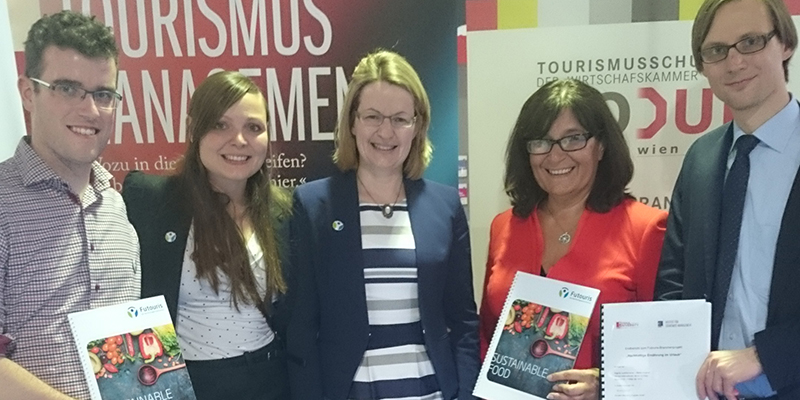Sustainable food on holidays – a handbook for hotels and tourism businesses
April 12, 2016
The project “Sustainable Food on Holidays”, contracted by the sustainability initiative of the German-speaking tourism organization FUTOURIS, has come to a successful conclusion.
The project was carried out by Prof. Dr. Dagmar Lund-Durlacher and Hannes Antonschmidt (MODUL University Vienna), Klaus-Peter Fritz (FHWien of WKW) and Mag. Dietmar Kepplinger (Kondeor) from September 2015 to March 2016 and presented at the ITB Berlin.
The main goal of the project was to develop a deeper understanding on what is actually comprehended by the concept of sustainable food, and what holidaymakers really think about sustainable food consumption while travelling. Furthermore, the researchers also wanted to explore how tourism businesses are working on the implementation of sustainable food policies.
In order to reach a balanced approach, the research team carried out a review of the existing literature, a quantitative consumer survey with more than 8,000 respondents, and field visits in Gran Canaria and Antalya, Turkey. During the field visits, 23 interviews with hotel and cruise ship representatives and systematic, checklist-based assessments of sustainability aspects in food operations in 10 hotels and one cruise ship were conducted.
Results of the project were summarized in a project report and in a how-to manual for tourism practitioners. Key findings include:
- Sustainable food is a multidimensional concept:
an analysis of existing academic and practical literature revealed that the concept of sustainable food constitutes multiple dimensions that can be grouped into five sectors: economy, ecology, society, health, and culture. - Implementation through hotels and cruise ships on a low level:
While interview partners were generally interested in the concept of sustainable food, the overall level of implementation into business strategies and operations is low. - Results of the Customer Survey:
In general, sustainable food is important for package holiday travellers. Up to 40% of all clients care a lot about sustainable food while travelling. Interestingly, local ingredients and regional food play a dominant role when it comes to customer attitudes, while other dimensions like organic or fair trade food are not that important (although still considerable).
The study concludes that hotels should work on several key areas to improve their sustainability performance:
Awareness Raising and Knowledge Transfer
One key step on the way to sustainable food strategies is to raise awareness for the topic among staff and management. This can be achieved with specialized training sessions or “train the trainer” programmes for members of the management. Further measures could be the introduction of manuals and tools for the operational staff.
Guest Communication
Informing guests about food sustainability can be a useful way to change their behaviour. Communication thereby can take place through media channels (print, film) or directly at the places where food is served (e.g. through signs that inform about the foodstuff or through members of staff).
Setup of Local Producer/Supplier Networks
The interviewed experts stated several obstacles for an increased offer of local products in the hotel such as quantity/quality risk and high prices of local food. These can be overcome by local food networks that share produce, infrastructure, and other resources to offset their economic disadvantages.
More information and the handbook for practitioners can be found and downloaded on the our website.
Photo L-R , Klaus Fritz, project partner from FH Wien; Swantje Lehners, Futouris, CEO projects; Inga Meese, CEO Futouris; MU's Dagmar Lund-Durlacher and Hannes Antonschmidt at the ITB Berlin





